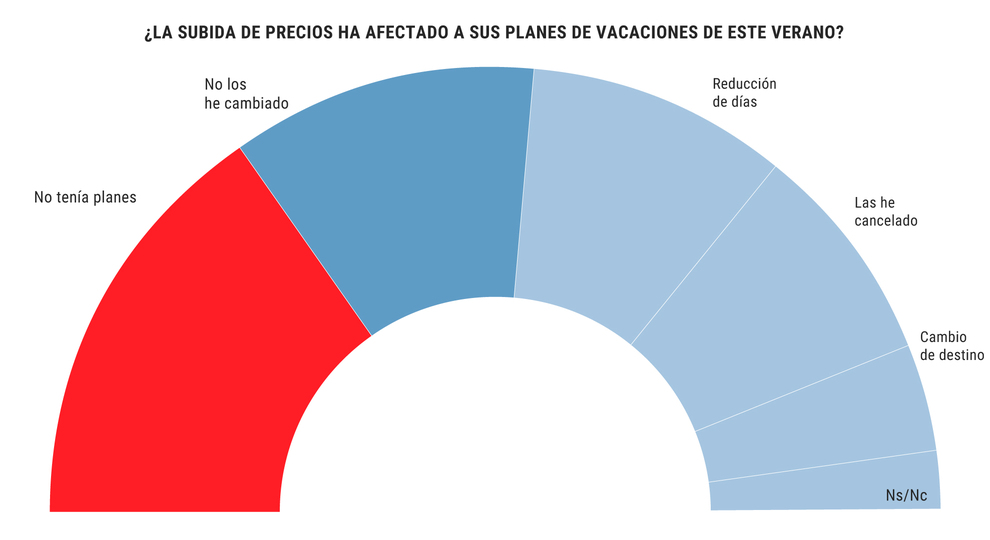The Feijóo Panel surpasses Sánchez by 38 seats in its first 100 days
The Panel The PP attracts 618,000 voters of Pedro Sánchez
The unstoppable rise in prices that already affects practically all goods and services, and is measured in two-digit percentages, imposes rigor on the lives of Spaniards.
There are fewer and fewer people whose standard of living is not noticeably affected by the uncontrolled increase in inflation.
The so-called tax on the poor extends its tentacles and breaks social borders to the point that this summer, the first to be caressed normally after the pandemic, practically half of the citizens have been forced to change their vacation plans.
The inflationary virus snakes and contaminates all sectors.
From fuel to food through accommodation, services, transport and leisure, the consumer price index already above 10% triggers the budgets reserved for the summer period and forces citizens to review accounts and rethink activities.
42.6% of Spaniards admit to having already modified their summer plans in view of the rise in prices.
Thus, some -7.6%- have chosen to change the destination they had planned for a more affordable one or have reduced the days of leisure -18.8%- that they planned to enjoy in order to lower the final bill, and there are even those who have opted directly -16.2%- to cancel the vacation.
Barely one in five say they keep their plans intact and practically one in three explains that they have not made any changes because they had not planned anything for the holidays.
The blow to the pocket affects voters regardless of age and ideological affiliation, although it is the voters of the two parties that make up the government coalition - PSOE and United We Can - who to a lesser extent claim to have modified their summer urged by the rise in prices.
Holidays thus become a first gauge of the restlessness that has settled in the Spanish.
66% now believe that the country's economic situation is bad or very bad, and this includes 46% of Socialist voters and 48% of
UP
voters .
Much more negative are the voters of PP, Vox and Ciudadanos;
in his case, the negative assessment of
Spain
's economic health exceeds 80%.
The prospects that the situation will change in the coming months are not very encouraging.
In fact, the
Government
has already begun to send messages to the population warning that they must be prepared for a difficult autumn and winter, especially if the war in Ukraine continues and its pernicious effects on European economies continue or even are aggravated.
Against this background, almost a third of voters -29%- turns their eyes towards the PP and considers that it is the most capable party to manage the crisis and face the blow of inflation.
For the PSOE bet 18% while the rest of the formations -
Vox, United We Can
, More Country and
Citizens
- are far behind without reaching 9%.
In fact, the most anticipated and applauded measure to deal with inflation is, in the opinion of 48% of those surveyed, the reduction in
VAT
on electricity from 10% to 5%.
It is a proposal sponsored by the PP for several months and to which the Government has resisted until the last minute, calling it "cosmetic".
Finally, it has agreed to include it in the second anti-crisis decree approved by the
Council of Ministers
at an extraordinary meeting ten days ago and which will be submitted for validation by
Congress
next week.
There is also broad support -40%- for the
United We Can
proposal to apply a tax on the extraordinary profits of energy companies, following in the footsteps of other European countries.
The purple voters are the ones who most advocate this measure -66%- followed by the socialists -52%-.
The voters of the
PP
are the least favorable to it.
Maintaining the bonus of 20 cents per liter of refueled fuel but discriminating this aid, which is now universal, based on the consumer's income, has the support of 30% of Spaniards.
The percentages of acceptance of the voters of the different parties are very similar.
Less support raises the delivery of a check for 200 euros to self-employed, unemployed and families with very low incomes as well as a 50% reduction in the price of transport passes.
Both proposals are incorporated in the anti-crisis decree that, if it is validated by Congress, will be in force until December 31.
Faced with this scenario of economic uncertainty and in view of the proposals launched by each other to try to redirect the situation, Spaniards point to the first opposition party, the PP, as the closest to the concerns and problems of citizens.
However, the distance with the PSOE in this case is not great, just three points, which seems to confirm that the citizens recognize the Government's clear concern for alleviating the people's problems, although with prescriptions that until now have not supplied the promised effect.
DATA SHEET
Reference population and geographical area:
People aged 18 and over residing in Spain.
Information collection technique
: Through the Sigma Dos Panel by Trust Survey.
Mixed telephone (CATI) / online (CAWI) / RRSS methodology.
Sample size:
1,212 interviews.
Selection of sampling units
: In the telephone interview by means of random household selection and application of sex and age quotas in the selection of the last unit.
In the case of the panel, proportional allocation by sex and age group has been applied.
The distribution of the sample has been proportional by Autonomous Community in both samples.
Margin of error:
The absolute sampling error can be limited by ±2.9% for a confidence level of 95.5%, and in the assumption of variables with two equally distributed categories.
Fieldwork Date
: June 27 to 29, 2022.
Realization:
SIGMA TWO.
Technical direction:
Jose Luis Rojo Gil.
Conforms to The Trust Project criteria
Know more
PP
PSOE
United We Can
vox
citizens
More Country
Minister council
Ukraine
parental pin

